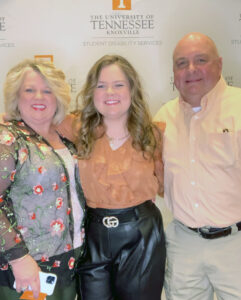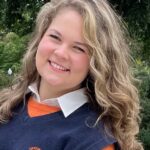Student Disability Services (SDS) within the Division of Student Life provides an accessible university experience for students with disabilities. The staff members work with students to create an individualized plan to break down barriers and help students meet their academic, professional, and personal goals while at UT.
SDS offers a variety of services such as note taking, testing accommodations, sign language interpreting and transcribing, accessible media services, housing accommodations, and more. In addition to helping students get accommodations, the office also works with the university to educate the community on barriers to access and ways to make programs, events, and classes more accessible to students with disabilities. The staff will regularly share information and updates regarding ADA compliance and how the campus can improve accessibility.
One of the main reasons Madison Allen, a senior majoring in nuclear engineering, chose to attend UT is because of her experience with the SDS office. She notes that the office and the staff have been instrumental in her success at UT and have been very welcoming and personable to work with.
“My experience with the staff in SDS has always been excellent,” said Allen. “They all have become my big orange family here on campus.”
Similarly to Allen, senior business major Nathan Hethcox also explains how the staff in SDS helped him to get the support he needed to succeed from the very first interaction he had with their office coming into UT as a first-year student.
- Madison Allen
- Nathan Hethcox
“The very first intake meeting with them was very detailed and helpful,” said Hethcox. “From the start, it’s a very individualized approach. SDS listened to our concerns and helped us develop a plan for success. It made me feel more at peace.”
Scholarships
In addition to providing students with resources and accommodations, SDS also has several scholarships available to students who utilize the services provided by the office. There are currently two scholarships available: the Robert L. and Helen Johnson Scholarship, which is awarded to one student, and the Students with Visual Disability Scholarship, which is awarded to three students. Additionally, the UT Haslam College of Business has a scholarship for students with learning disabilities that students may also apply for.
David Ndiaye, director of Student Disability Services, believes that scholarships offer a unique opportunity to celebrate student success. “The SDS scholarships afford us the opportunity to recognize students’ academic achievements and perseverance while providing a financial assistance that is often much needed,” said Ndiaye. Student Disability Services awarded $6,500 in scholarships in the 2021-2022 academic year.
Allen was a recipient of a 2020 scholarship from SDS, noting that receiving the $1,500 scholarship provided her with the support and assistance she needed in order to pursue her career goals as a student with a disability. She was recognized as the 2020 Students with Visual Disability Scholarship recipient at the SDS Awards Banquet early that year and served as the keynote speaker for the 2022 SDS Annual Awards Banquet two years later.

Allen with her parents at the 2022 scholarship banquet.
Peer Mentor Program
Creating connections and building community is critical for students and their success. Several offices within Student Life utilize a peer mentoring program to connect new students to current students to help them navigate campus and life at college.
The peer mentoring program in SDS helps first-year students become knowledgeable about and comfortable with the campus, SDS, and college life in general by pairing them with a returning student who is also registered with SDS.
Both Hethcox and Allen participated in the SDS Peer Mentor Program and indicated how meaningful this experience was to them. They both expressed how they wanted to provide new students with guidance and support during their first year.
“It’s a rewarding experience,” said Hethcox.
“I wanted to be able to help students who were in my shoes and be a friend to students on campus. I’ve had four years of experience with SDS and I want to help them understand it quickly.”
Student Advisory Board
To hold themselves accountable and improve the services they provide to students, SDS works with a Student Advisory Board (SAB). Established in the fall of 2020, the SAB has been instrumental to SDS in obtaining feedback from students about their experiences on campus. One piece of feedback received was related to faculty training and ensuring a resource is available to instructors to learn about SDS and the services provided. An asynchronous faculty course on Canvas was developed in collaboration with the SAB and the Faculty Advisory Board.
The SDS Student Advisory Board was established as a critical partner in reviewing proposed modifications to help ensure that SDS is doing what is in the best interest of students while following university policy and legal requirements.
“I’ve served as an SDS student advisory board member for two years,” said Allen. “I am able to give advice and insight from a student perspective on ways SDS can improve and modify their services to create a more accessible experience for all students at UT.”

